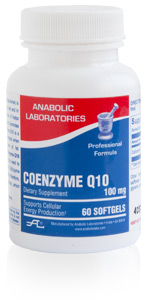Anabolic’s Coenzyme Q10 is available as 100 mg softgel capsules in either 30 or 60 count bottles.
Dr. Anthony Linnane explains that coenzyme Q10 (CoQ10) functions as 1) a driver of ATP synthesis (body energy production), 2) a powerful antioxidant, and 3) a key regulator of skeletal muscle gene expression, which means that the health and longevity of our skeletal muscles is influenced by CoQ10 levels (1).
Linnane alerts us to the fact that CoQ10 supplementation may be useful in conditions related to reduce energy production and increased free radical production, such as congestive heart failure, muscular dystrophy, chronic fatigue syndrome, breast cancer, primary biliary cirrhosis, migraine headaches, and Parkinson’s disease (2). In a double-blind trial using 300 mg of CoQ10 versus placebo, CoQ10 supplementation significantly reduced migraine headache frequency (3), and taking up to 1200 mg per day slowed the development of Parkinson’s disease (4).
Dr. Frederick Crane is the researcher who discovered CoQ10 and he states that, by supplementing with at least 100 mg per day we can double our blood levels of CoQ10, which is thought to be helpful in protecting against disease expression (5). The importance of this recommendation can be better appreciated when we consider the extent to which CoQ10 levels are reduced as we age.
Dr. Crane explains that, as we age, most of our body organs lose appreciable amounts of CoQ10. For example, from the age of 20-30 to 80, there is a 58% decrease in the heart, an 83% decrease in the pancreas, a 50% decrease in the adrenal gland, a 17% decrease in the liver, a 45% decrease in the kidney, and a 75% decrease in the skin.
Taking at least 100 mg per day seems to be a reasonable recommendation. The age at which we should begin such supplementation is not known. According to information presented by Dr. Crane, it seems that 30 years of age is a good time to begin supplementation.
CoQ10 may also be a very important supplement to consider for those taking statin drugs to lower cholesterol. Statins are one the most commonly prescribed medications today. While statins do lower blood levels of dangerous LDL-cholesterol and C-reactive protein, statins also reduce the body’s synthesis of precious CoQ10 by about 25-60% (5,6). This is because CoQ10 and cholesterol are made in the same pathway from the same precursor substance called HMG-CoA.
Common side effects of statins are thought to be due the inhibition of CoQ10 synthesis, which include: muscle pain (7), difficulty breathing (7), polyneuropathy (8), fatigue (9), severe irritability and aggression (10), and memory loss and cognitive defects (11). If you suffer from any of these side effects, you may want to discuss CoQ10 supplementation with your physician.
You may find it interesting to note that statin drugs have been patented as the “statin” alone, AND as the “statin plus CoQ10” (12). In other words, from the beginning of statin development and testing, researchers knew that statins depleted the body of CoQ10. Presumably, it was thought that statin use would not likely lead to create serious side-effects in most individuals, and so statins first entered the marketplace as just the statin drug itself. However, as researchers knew statins depleted CoQ10, “statin plus CoQ10” medications were also patented. To date, no “statin plus CoQ10” drug has reached the marketplace, and we can only speculate as to why this may be the case. Perhaps it is because of the expense associated with adding CoQ10 to statin meds.
References
- Linnane AW, Zhang C, Yarovaya N et al. Human aging and global function of coenzyme Q10. Ann NY Acad Sci. 2002; 959:396-411.
- Linnane AW, Kopsidas G, Zhang C et al. Cellular redox activity of coenzyme Q10: effect of CoQ10 supplementation on human skeletal muscle. Free Rad Res. 2002;36:445-453.
- Sandor PS et al. Efficacy of coenzyme Q10 in migraine prophylaxis: randomized controlled trial. Neurology. 2005; 64(4):713-5.
- Shults CW, Oakes D, Kieburtz K et al. Effects of coenzyme q10 in early Parkinson disease: evidence of slowing of the functional decline. Arch Neurol.2002; 59(10):1541-50.
- Crane FL. Biochemical functions of coenzyme Q10. J Am Coll Nutr. 2001; 20:591-98.
- Rundek T et al. Atorvastatin decreases the coenzyme Q10 in the blood of patients at risk of cardiovascular disease and stroke. Arch Neurol. 2004; 61:889-92.
- Langsjoen PH et al. Treatment of statin advese effects with supplemental coenzyme Q10 and statin drug discontinuation. BioFactors. 2005; 25:147-52.
- Gaist D, Jeppesen U, Andersen M, Garcia Rodriguez LA, Hallas J, Sindrup SH. Statins and risk of polyneuropathy: a case-control study. Neurology. 2002; 58(9):1333-7.
- Golomb BA. Statin adverse effects: implications for the elderly. Geriatric Times. Vol (3); May/June 2004. http://www.geriatrictimes.com/g040618.html
- Golomb BA, Kane T, Dimsdale JA (2004), Severe irritability associated with statin cholesterol-lowering drugs. QJM. 97(4):229-235.
- Wagstaff LR, Mitton MW, Arvik BM, Doraiswamy PM. Statin-associated memory loss: analysis of 60 case reports and review of the literature. Pharmacotherapy. 2003; 23(7):871-880.
- Patent #s for statin drugs with coenzyme Q10: 4,929,437; #4,933,165; #5,082,650; #5,316,765





